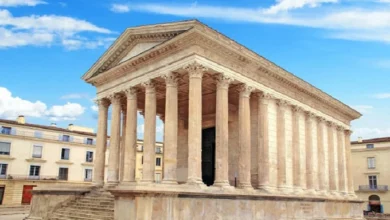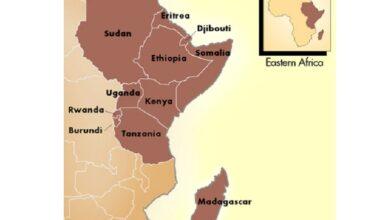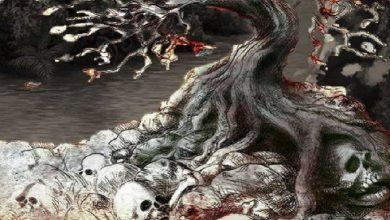12 intriguing facts about the explosion in Beirut, Lebanon
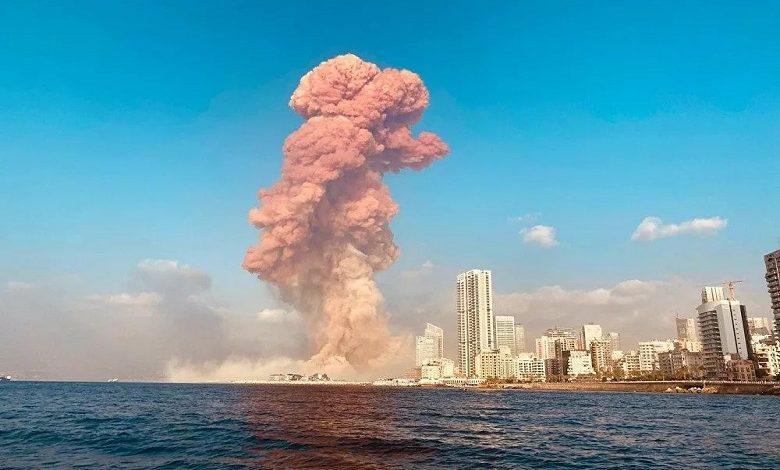
A powerful explosion occurred at the seaport of Beirut and near the base of the Lebanese Navy. Some people lost their lives, thousands of others injured, and many become homeless.
A major explosion sounded on Tuesday, the 4th of August at the seaport of Beirut and not far from the Lebanese Navy base, the large blast was preceded by the sound of a small explosion. Five minutes later, a column of black and white smoke rose into the sky. The massive explosion was then followed by the appearance of red smoke.
Photos and videos posted on social media show the smoke enveloping the city. Some local media have broadcast images of people trapped under rubble, some covered in blood, according to different sources. After the blasts, several intriguing facts started surfacing, below are the 10 that will be interesting to know.
1. People think it was an earthquake
Firstly, the origin of the explosions remains unknown for the moment. A resident of the city, who witness the explosion explained her ordeal. “I had just returned home, the clock read 5:11 pm. Suddenly I felt a strong shock that shook the whole house. I thought of an earthquake, then I found pieces of glass that had shattered,” says Natalia Khassami, resident of Hazmieh, east of Beirut.
She adds that her neighbors saw a vast black cloud that seemed to have been thrown to the ground by a very powerful blow. “A strong wind arose, and it became more and more powerful for a few seconds. It was followed by a real rumbling and an earthquake: the walls and the windows trembled.”
“Then, the wave of shock began to shatter the windows, we heard the crash of the explosion, and the vibrations increased. Everything continued to collapse for 10 minutes and people, panicked, began to leave their homes. Then, all of a sudden, everything stopped,” she concluded.
At that time, Al Mayadeen rejects the trail of a terrorist attack but advances that of an explosion in a warehouse housing
2. Beirut proclaimed “disaster city”
After the powerful explosions that occurred on the 4th of August, Beirut was proclaimed a “disaster city”. The Superior Council of Defense declared Beirut a “disaster city” after the loud explosions which rocked the city’s port, causing damage of an unprecedented scale in all its districts.
The Council, which notably brings together the President, the Prime Minister and the Minister of Defense, “recommends” to the government to declare a state of emergency, according to the National News Agency (ANI). “A major disaster has befallen Lebanon,” lamented President Michel Aoun at the opening of the meeting.
3. Israeli plane was suspected
After the blasts, many fingers were pointing towards the Israeli plane, attributing the cause of the explosion to the flight due to its presence on the sky shortly before the blasts. Not quite long, the unconfirmed news circulated throughout the media.
Lebanese Interior Minister Mohammed Fahmi then described speculation circulating on social media about an alleged appearance of Israeli planes in the skies of the capital shortly before the explosions as intoxicating and “fake news”.
The Lebanese Armed Forces also rejected allegations of deliberate sabotage. “These are erroneous rumors, we have to wait for the official results of the investigation,” the army said in a statement. Israel, on the other hand, has rejected the theories that it carried out a strike against the port of Beirut.
4. Officials from the port of Beirut arrested
At least 16 officials from the Port of Beirut and customs authorities were arrested after the explosion. As part of the investigation into the devastating blasts of a warehouse, the military prosecutor then detained and the officials involved.
They are “responsible for the board of directors of the port of Beirut and the customs administration, and those responsible for maintenance work and [workers] who carried out work in hangar number 12,” said the prosecutor in a statement. Port manager Hassan Koreitem also among the detainees.
The government has previously decided to house administrative staff at the affected port until the guilt of the double explosion, which damaged half of the Lebanese capital is established.
5. A baby was born in full explosion
At the time of the powerful explosions that sounded in the port of Beirut on the 4th of August, a baby was being born in a delivery room at Saint George University Hospital, a few kilometers from the starting point of the disaster. The baby is perfectly healthy.
The moment when the explosion blows the windows and medical equipment in the delivery room was filmed by the baby’s father, the footage of which was shared on the “Long Live Lebanon” Instagram account.
The little boy, who was given the name George, and his family survived the disaster. They thanked the doctors and nurses who remained calm and helped the mother to give birth under these extreme conditions. The staff had to resort to the flashlight of their mobile phones because the blast of the explosion shattered all the windows and devastated the delivery room.
6. President suspect “missile” or “bomb”
The Lebanese President referred to the “possibility of outside interference such as a missile, bomb or other means” regarding the explosion that took place in Beirut and asked Emmanuel Macron to help him determine it.
The investigation into the deadly double explosion and devastating in the port of Beirut does not exclude the possibility of external intervention, declared the Lebanese head of state Michel Aoun. “The cause has not yet been determined. There is the possibility of external interference such as a missile, a bomb, or other means,” he said.
He insisted that Tthe research will be carried out in three directions: “First, how the explosive material entered and was stored […], second, is the explosion the result of negligence or an accident […] and third, the possibility that there is outside interference.” Head of State also addressed his French counterpart, asking him to “provide him with aerial images” so that Lebanon can determine “whether there were planes in [air] space or missiles” at the time of the disaster.
7. Conspiracy theories on what trigger the explosions
A bomb? A missile? While the investigation is still ongoing, speculation is rife about what sparked the explosions in Beirut. Especially since the statements of officials like Presidents Trump or Aoun come to enhance the fantasies on social networks.
On social networks, everything goes very quickly. While a monster explosion devastated the port of Beirut and part of the city, taking with it the lives of more than 100 people and injuring thousands more, at 6:09 pm, Twitter had already searched and found what had happened, and even who was responsible for it.
And the investigators of the little blue bird have imagination: nuclear bomb, Israeli strike, Hezbollah weapons depot… Everything is there, given the immensity of the explosion. However, these “specialists” in ballistics and pyrotechnics were quickly able to be confirmed in their theses by none other than the resident of the White House. Indeed, Donald Trump said at a press conference shortly after the explosion: “It looks like a terrible attack […] it doesn’t look like an industrial explosion. They [US generals, note] seem to think it was an attack, some kind of bomb.” Little rushed conclusions. Haste, which once again questions its ability, and that of its generals, to lead the world’s first army and NATO. His claims were also denied shortly after by the Pentagon.
However, it would simply have taken a few hours for Prime Minister Hassane Diab to lift the veil on what really happened: the explosions were caused by nearly 2,750 tons of ammonium nitrate, stored without precaution in a warehouse, for six years. “Everything that is most classic with ammonium nitrate”. A thesis validated by many experts: “This explosion is the most classic thing with ammonium nitrate. It is quite comparable with what happened on the AZF chemical complex in 2001 [in Toulouse, editor’s note]”.
8. Blast created a crater of 43 meters deep
The huge explosion at the port of Beirut created a crater of 43 meters deep, a Lebanese security source said on the 9th of August, citing evaluations made by French pyrotechnics experts dispatched to the field.
The explosion that occurred in Beirut was believed to be caused by the explosion of a warehouse where, according to Lebanese Prime Minister Hassan Diab, 2,750 tonnes of ammonium nitrate were stored for six years “without precautionary measures”.
By comparison, the 1962 explosion of a 104 kiloton atomic bomb at the Sedan nuclear test site in Nevada left a crater nearly 100 meters deep.
9. Several resignations
Lebanese Information Minister Manal Abdel Samad announced on the 9th of August that she was leaving the government, according to Al Jadeed. This is the first resignation of its kind since the deadly explosion at the port of Beirut.
“After the enormous disaster in Beirut, I present my resignation from the government,” declared the minister during her speech on television this Sunday before adding: “I apologize to the Lebanese, we could not meet their expectations.”
She is not the only one in the game of resigning. Ambassadors and several Lebanese MPs announce resigning from Parliament after the explosion. The predominantly Christian Lebanese Phalanges party has seen three of its members resign from Parliament, reports the daily L’Orient-Le Jour.
The deputies in question are Samy Gemayel, Elias Hankache, and Nadim Gemayel, son of the former President of the Republic, assassinated in 1982, Bachir Gemayel. The announcement was made during the funeral of the party’s general secretary, Nizar Najarian, killed by the explosion that took place in the port of Beirut. Nadim Gemayel, for his part, justified his resignation by denouncing “unproductive constitutional institutions”.
Several other representatives have also announced that they are giving up their legislative functions, in protest against the regime in place. This is the case of independent MP Paula Yacoubian, who told CNN she felt helpless and “a false witness” in the legislative chamber. MP Marwan Hamadé, affiliated with the Progressive Socialist Party, also resigned. His colleague Michel Daher preferred to slam the door of the Lebanese Fort parliamentary bloc, linked to President Michel Aoun.
The Lebanese Ambassador to Jordan, Tracy Chamoun, has also announced that she will be stepping down, pointing to the “carelessness” of the authorities in her country.
10. Journalist kicked out of seat during the explosion
The blast destroyed the studios of the British channel Arabic in Beirut. It was filmed live during a duplex interview conducted by journalist Meriem Toumi with a director of the Moroccan Agency for sustainable energy (Masen), Fayçal Al-Assil, in charge of solar energy projects. A video of the moment of the explosion was posted by the BBC and widely shared on social media.
As the journalist and her guest are about to begin their interview, an explosion echoes the power of which devastates the studio, throwing the journalist from her seat and knocking down her webcam.
The guest and another person standing next to him appear stunned and taken aback by what they have just seen. Journalist Meriem Toumi shouts: “Explosion in Beirut!”.
11. Priest flees his church during explosions
While celebrating mass, a priest fled his church when large debris began to fall as a result of explosions in the port of Beirut.
A video shared on social media shows a priest interrupting mass and hurriedly leaving the church in Beirut because of the damage caused by the explosions that occurred at the port.
In the video, the lights go out, the stained glass windows are blown out, and then large debris begins to fall on the man who decides to run away.
12. Protest
About 5,000 protesters had gathered in Martyrs’ Square between the harbor and the city center to mourn and protest. They are demonstrating against how the government has handled the most tremendous explosion in Beirut’s history.
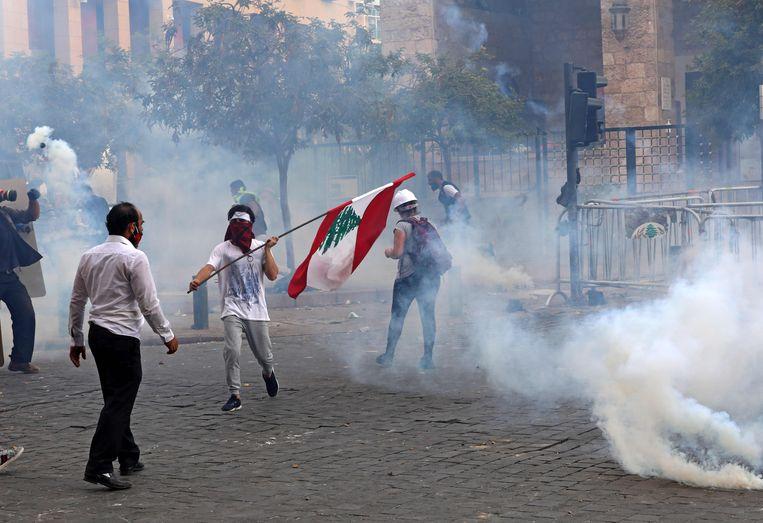
They accuse the political elite of mismanagement. The massive explosion killed nearly 160 people and injured at least 6,000 people. Much of the city is in ruins. The protesters shouted slogans such as “the people want the fall of the regime” and carried banners saying, “Get out, you are all murderers”. “We want a dignified future. We do not want the blood of the victims of the explosion to be wasted,” said one of the protesters. “The uprising and revolution continue,” said another. “President Michael Aoun, government leader Hassan Diab, and the entire political leadership are responsible for the disaster.”
Activists had called for the demonstration on social media under the slogan “Justice for the victims, revenge on the government.” Since October last year, there have been massive protests against the government. The protesters are demanding far-reaching political reforms. They accuse the political elite of corruption.

